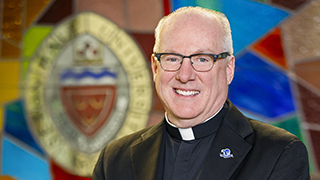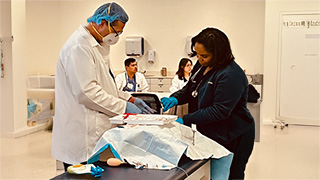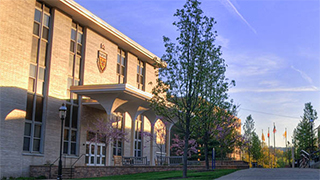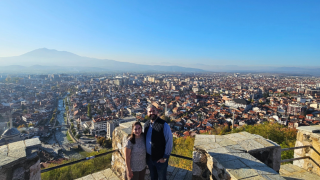Seton Hall Again Receives ‘High Research Activity’ Designation by Carnegie Foundation and ACE
Wednesday, February 19, 2025
![]() On February 13, the Carnegie Foundation for the Advancement of Teaching and the American
Council on Education released the first phase of a redesigned report on the 2025 Carnegie
Classifications with their research activity designations.
On February 13, the Carnegie Foundation for the Advancement of Teaching and the American
Council on Education released the first phase of a redesigned report on the 2025 Carnegie
Classifications with their research activity designations.
Seton Hall continues to be recognized as an R2 “high research activity” institution. That designation places the university among top national institutions — those receiving at least $5 million in total R&D funding and awarded at least 20 research/scholarship doctorates annually.
Research activity was a metric used in the basic classification. However, Carnegie is overhauling its classification system this year. Since the new classification will no longer include research in its methodology, 2025 research activity designations are being published separately.
 “Our strategic initiatives and investments have succeeded in maintaining Seton Hall’s
R2 status,” said Monsignor Joseph Reilly, S.T.L., Ph.D., president of Seton Hall. “We have surpassed our goals, as we are now a roughly $10
million research enterprise, receiving 18 research awards in the past academic year."
“Our strategic initiatives and investments have succeeded in maintaining Seton Hall’s
R2 status,” said Monsignor Joseph Reilly, S.T.L., Ph.D., president of Seton Hall. “We have surpassed our goals, as we are now a roughly $10
million research enterprise, receiving 18 research awards in the past academic year."
“As an R2 institution, we can pivot more quickly — and in more directions — to attract funders and grants, as well as hire exceptional faculty members who engage in original research and teaching, thereby enabling us to attract exceptional students and continue to grow,” Monsignor Reilly added.
Supporting Innovation
Research projects at Seton Hall come under four distinct areas:
- In the area of health and well-being, the School of Health and Medical Sciences established a Center for Interprofessional Education in the Health Sciences that
creates opportunities for meaningful cross-disciplinary educational, research and
clinical experiences. The goal is to further develop team-based, person-centered learning
in health care.
- Led by the College of Arts and Sciences and the Stillman School of Business, research advancement in the life sciences, data sciences, and analytics is taking
place at Seton Hall’s various centers and degree programs. Students and faculty gain
the opportunity to better understand societal challenges and positively impact the
world by synthesizing data in all forms, analyzing that data to find meaning, and
communicating information effectively to drive important discovery insights, as well
as applied policy, management and practice implications.
- In ethics, spirituality, and science, centers for ethics, interfaith dialogue, and
institutes of religious studies and communication promote theological engagement with
the natural sciences and medicine and probe the relationship between faith and reason.
This area brings together work at Seton Hall Law School, the School of Theology, College
of Arts and Sciences, School of Health and Medical Sciences, and College of Human
Development, Culture, and Media.
- Research in the thematic area of society, technology, and communication fosters ethical, servant leaders for diverse local, regional and global communities. This is enabled by formal and informal systems education, public and international safety, savvy diplomacy and international relations, technology as a tool and a means to liberation, and communication in all forms, especially digital communication. The College of Human Development, Culture, and Media and the School of Diplomacy collaborate in research in these areas.
By the Numbers in 2023-24:
- 38 unique grant applications
- $29 million in new research proposals
- 18 research awards
- 13 faculty members awards
- 2 institutional awards over $1 million
- 4 research awards $1 million+
- 6 colleges and one institute submitted proposals|
- $10 million in total awards
Leading the Way
A nearly $1 million National Institute of Standards and Technology grant, championed
by Rep. Mikie Sherrill and Sen. Cory Booker, to enhance semiconductor research, will
upgrade scientific equipment and establish a laboratory focused on low-temperature
plasmas and next-generation semiconductor materials. Supporting the U.S. manufacturing
industry and aligning with the CHIPS and Science Act of 2022, the funding will enhance
research facilities, providing students with access to advanced resources for their
careers in this critical field.
 At the Interprofessional Health Sciences campus, $1.14 million in federal funding
to provide new equipment and upgrades to the Simulation Center to ensure future nurses,
occupational therapists, physician assistants, physical therapists, speech language
pathologists and athletic trainers are clinically ready before interacting with real
patients and to prepare future health care professionals to work in a patient-centered,
integrated health care delivery system, and addressing health care workforce shortages
and demand throughout New Jersey and beyond.
At the Interprofessional Health Sciences campus, $1.14 million in federal funding
to provide new equipment and upgrades to the Simulation Center to ensure future nurses,
occupational therapists, physician assistants, physical therapists, speech language
pathologists and athletic trainers are clinically ready before interacting with real
patients and to prepare future health care professionals to work in a patient-centered,
integrated health care delivery system, and addressing health care workforce shortages
and demand throughout New Jersey and beyond.
A Lilly Endowment Inc. $1.25 million grant was awarded to help the Immaculate Conception Seminary School of Theology establish a Preaching as Hospitality formation program. The five-year, multi-faceted effort will support the growth of preachers who embrace ICSST’s vision of hospitality in the church as they welcome and engage congregations with the Word of God. Funded through Lilly Endowment’s Compelling Preaching Initiative, Preaching as Hospitality will provide an enriched curriculum, opportunities that foster and support inspiring preaching, and help preachers unite people with God and establish a strong connection to their Christian faith.
Coming Next
Look for the Carnegie Foundation and the American Council on Education to further
address university institutional classifications in the spring, as the organizations
embrace new methodologies more reflective of the complexities and multidimensional
nature of higher education since these rankings were established in 1973. While the
research designation will continue as a separate category, the new classifications
aim to be more representative and more adequately reflect university missions and
student experiences to contextualize the roles of institutions and learners in a manner
not reflected historically.
“The classification no longer captures the breadth of today’s post-secondary institutions, particularly the wide variety of institutional missions and organizational structures, and it does not always group similar types of institutions … and does not adequately describe the full scope of work taking place across their campuses. We hope a revised classification structure that includes a multidimensional look at institutions will be more useful for those who use the classification,” noted the Carnegie Foundation and the American Council on Education on their website.
Learn more about research and innovation at Seton Hall here.
Review the latest grants and research services annual report here.
Categories: Health and Medicine, Research






